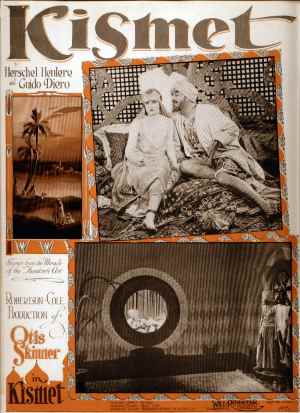|
The sheet music apparently was not published until 1920 by Will Rossiter of Chicago in a piano/vocal arrangement by F. Henri Klickmann. The lyrics, by Herschel Henlere -- who played piano early on the vaudeville circuit and became an arranger and musical director for films in the early days of Hollywood -- depict the suffering of a woman who is sold into the harem of an Arabian sheik.
Out on the desert of old Araby,
There lived a maiden in captivity;
Her heart and soul had been sold
into a Harem for gold,
And while they'd feast, she'd slowly turn to the East
and sing while the Temple bells would ring:
Kismet! the golden sunset
Still finds me here a slave.
Tell me how long it will be
Before my heart finds the love I crave.
Kismet! my lips have ne'er met
Kisses of love sincere;
Oh! come bring me my freedom
Thou mighty Kismet, and take me from here.
Years bro't more sorrow the maid's cast aside,
All beauty gone, her one tho't is to hide;
Yet in her youth she had dreamed
Heavenly visions it seemed --
Now ev'ry night beneath the mystic moonlight,
she'd cry while the desert winds would sigh:
Kismet! the golden sunset
Still finds me here a slave.
Tell me how long it will be
Before my heart finds the love I crave.
Kismet! my lips have ne'er met
Kisses of love sincere;
Oh! come bring me my freedom
Thou mighty Kismet, and take me from here.
In Kismet, the role of Haji was played by the great American stage actor Otis Skinner (1838-1942), who was billed as America's Foremost Romantic Actor. Although he played hundreds of roles in all parts of the world during a career extending over 60 years, he is best known for Kismet, which he played on Broadway between 1911 and 1914.
Kismet is an Arabian Nights fantasy in which Skinner offers a crafty performance as Haji, a Baghdad beggar. He is surrounded by a gallery of colorful characters. Jawan, the White Sheik, is Haji's longtime adversary, a now-repentant outlaw who years before had stolen the beggar's wife and killed his son. Caliph Abdalla is the handsome, all-powerful ruler of Baghdad, while the villainous Mansur, the Wazir of Police, manipulates Haji into pledging to assassinate the Caliph. Marsinah, Haji's daughter, a pretty, virginal maid, is the Caliphs beloved - and is also desired by Mansur as the newest addition to his harem. Kismet is crammed with much grandeur, romance and intrigue, with its lavish sets and costumes worthy of special praise.
In 1921, FBO (Film Booking Office) Studios of Hollywood -- also owned by Robertson-Cole -- released their first silent film: Kismet, starring Otis Skinner. The script was written by Charles E. Whittaker (based on Knoblock's play) and directed by Louis J. Gasnier. The film had an original 98-minute organ score as well as an orchestral arrangement for a fourteen-part pit orchestra for performance in the larger cinema theaters.
In 1930 Skinner brought back the character of Haji in a sound version of the same story starring Loretta Young, David Manners, Mary Duncan and Sidney Blackmer. The script was written by Howard Estabrook (from the original play by Edward Knoblock), directed by John Francis Dillon and released by WB/First National Pictures. The program stated, "The camera catches the full sweep of Kismet's drama and oriental magnificence."
In this second film (but first talking) version of the play, Haji, the wily Baghdad magician-beggar (Otis Skinner) goes from rags to riches to rags again to riches again in the space of 24 hours. Outwitting the evil wazir Mansur (Sidney Blackmer), Haji manages to install himself in the royal palace, romance the wazir's gorgeous "head wife," Narjis (Blanche Frederici), defeat the wazir's schemes and arrange the marriage between his own daughter Marsinah (Loretta Young) to young Caliph Abdallah (David Manners).
Filmed in experimental 65 MM wide screen and utilizing early Technicolor, no print or negative of Kismet exists and it is therefore considered a "lost" film.
Kismet was recorded on a piano roll played by two fine ragtime pianists: Roy Bargy and Charlie Straight. Kismet was also recorded by Guido Deiro as an accordion sol
| Back | Next |
